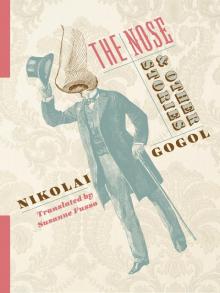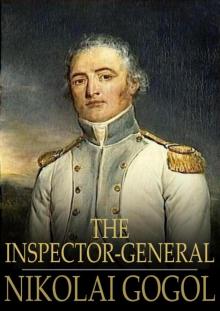- Home
- Nikolai Gogol
Diary of a Madman and Other Stories Page 2
Diary of a Madman and Other Stories Read online
Page 2
To-day, however, a light dawned on me: I remembered that conversation of the two dogs in the Nevsky. “Good,” I thought to myself, “now I will find out everything. I must get hold of the correspondence of the wretched dogs. There I am sure to find out something.” To tell the truth, I went so far as to call Madgie to me, and said to her: “Look here, Madgie; here we are alone. If you like I shall shut the door, too, so that no one shall see us talking. Tell me all you know about your mistress: what she is and how she behaves. I swear I won’t tell any one.” But the mischievous beast put her tail between her legs, doubled herself up, and sneaked away to the door as though she hadn’t heard. I have long suspected dogs of being far more intelligent than human beings; I was convinced that they had the gift of speech, only they are singularly obstinate. They are great politicians: they notice everything, one’s every step. No, whatever happens, I will go to-morrow to Zverkov’s house, I will question Fidèle, and, if possible, I will seize all the letters she has received from Madgie.
NOVEMBER 12
AT two P.M. I set out determined to see Fidèle and question her. I can’t endure cabbage, the smell of which issues from every wretched grocer’s shop in Meschanskaya Street; besides, there came such a hellish stench from under every gateway that I hurried on as fast as I could, holding my nose. To add to the rest, the dirty artisans let off such a lot of soot and smoke from their workshops that it becomes impossible for a gentleman to take his walks in that neighborhood. When I climbed up to the seventh floor and rang the bell, a girl came out to open the door, not at all bad-looking, with little freckles. I recognized her: it was the one whom I had seen in company of the old lady. She got a little red, and I at once saw what it was—it’s a young man you want, my dear. “What do you want?” she asked. “I must have a few words with your dog.” The girl was stupid. I saw at once that she was stupid. At that moment the dog ran in, barking. I tried to get hold of her, but the nasty animal almost bit my nose. However, I caught sight of her basket in the corner. That was just what I wanted! I went up to it, rummaged in the straw, and to my great delight extracted a bundle of small slips of paper. The wretched dog, seeing this, began by biting me in the calf; when she realized that I had taken her letters she whined and fawned on me, but I said: “No, my dear, good-bye,” and hastened away. I expect the girl must have taken me for a madman, as she was terribly frightened. When I got home my first intention was to set to work at once to take stock of the letters, for I can’t see very well by candle-light. But Mavra had taken it into her head to wash the floor. These stupid Finnish women are apt to have fits of cleanliness at the wrong time. So I went out to walk about and think over the occurrence. Now at last I could find out all those acts and thoughts, and all the hidden springs! Now at last I could get to the bottom of it! These letters would reveal everything. Dogs are intelligent people, they understand all about politic relations, and so no doubt I shall find there everything about our Director: the portrait and all the doings of that worthy. There will be something in them, too, about her who . . . But no, no, not a word! Toward evening I returned home. For the most part lay on my bed.
NOVEMBER 13
WELL! Let us see! The writing is fairly legible, but still there seems to be something doggish about it. Let us read:
“Dear Fidèle, I cannot get accustomed to your middle-class name. Could not they have given you a better one? Fidèle, Rose—what vulgar taste! However, this is only by the way. I am so glad we had this idea of starting a correspondence.”
The letter is very correctly written. The spelling, and even the punctuation, are quite right. To tell the truth, our Chief of Section would have been hard put to it to write as well as this, for all his talk of having been at a university. Let us go on:
“It seems to me, that to share one’s thoughts, one’s feelings, and one’s impressions with another is one of the greatest blessings on earth.”
Hum! an idea borrowed from a work translated from the German. I forget the title.
“I speak from experience, although I have not seen much of the world beyond the gates of our house. Is not my life spent in comfort and in plenty? My young mistress, whom Papa calls Sophie, is passionately fond of me.”
Oh, oh! But no, no, not a word!
“Papa, too, often fondles me. I am given tea and coffee with cream. Ah, ma chère, I must tell you that I find no pleasure in the big, gnawed bones our Polkan feeds on in the kitchen. Bones are nice only when they are those of game, and then only if the marrow has not been sucked out already. It is delicious to mix sauces, if only they contain no capers or green stuff; but I know nothing more disgusting than the habit of giving dogs little balls of bread. Some one at the table, who has been touching all sorts of nasty things with his hands, starts rolling up bread with those hands, calls you up, and thrusts the ball into your mouth. It would be impolite to refuse, and you have to eat it: whatever the repulsion you feel, you have to eat it.”
What damned nonsense! As though there were nothing more suitable to write about. Let us turn the page, and see if there is anything less silly.
“. . . it will be a pleasure for me to keep you informed of all our news. I have already alluded to the principal gentleman here, whom Sophie calls Papa. He is a very singular man.”
Ah, here we are at last! I expected that; they have their political views of everything. Let us see what she has to say about Papa:
“. . . a very singular man. As a rule he is silent, and speaks very seldom. But last week he never stopped saying to himself: ‘Shall I get it, or shall I not?’ He would take a slip of paper into one hand, and close the other hand empty and say: ‘Shall I get it, or shall I not?’ Once he asked me: ‘What do you think, Madgie, shall I get it, or shall I not?’ I couldn’t for the life of me understand what he meant, so I sniffed at his boot and walked away. A week later, ma chère, Papa came in beaming with happiness. All the morning gentlemen in uniform kept on arriving to congratulate him on something. At table he was in a better humour than I have ever seen him in before, and told comic stories. After dinner he lifted me up to his neck and said: ‘Look at this, Madgie, what do you think it is?’ I saw a small ribbon. I sniffed at it, but could not discover any smell whatever; finally I licked it. It had a faint salt taste.”
Hum! the dog is getting rather . . . She must take care or she will get thrashed. Oh! so he is ambitious! This must be made a note of.
“. . . Adieu, ma chère! In great haste, etc., etc. I will finish my letter tomorrow. —Well, good morning! Here I am again. To-day, my mistress Sophie . . .”
Well, what about Sophie? Damnation! But no, no . . . on with the letters:
“. . . my mistress Sophie was in a great flutter. She was going to a ball, and I was delighted, because while she was away I could write to you. My Sophie is always delighted to go to a ball, though she usually gets angry when she is being dressed. I have never been able to understand why people dress. Why do not they go about as we do, for instance? So nice and convenient. Nor can I ever understand, ma chère, what pleasure there is in going to a ball. Sophie always comes home from balls at six in the morning, and I can almost always guess, from her pale and exhausted face, that the poor girl has been given nothing to eat. I must own, I could never live like that. If I did not get game and sauce, or a roast wing of chicken, I really don’t know what would become of me. Sauce and gruel is also all right; but carrots, turnips or artichokes can never be anything but nasty.”
A very uneven style. One sees at once it is not a human being writing: it begins all right, but before you have got far the dog will out. Let us try one more letter. It looks rather long. Hum! and it gives no date:
“Ah, my dear, how one feels the approach of spring! My heart beats as if I were all the time expecting some one. There is a ceaseless ringing in my ears, so that I often stand for minutes at a time with one leg in the air, listening at the door. I won’t conceal from you that I have many suitors. Often I sit at the window and look at them. If
only you knew how ugly some of them are! One is the most ungainly of mongrel curs, dreadfully stupid, stupidity writ large on his face. He walks up and down the street with an air of importance, imagining that he is a very find gentleman, and that you admire him as soon as you see him. Not a bit of it. I actually paid no attention to him, just as though I had not seen him. But what a terrible Great Dane stops before my window sometimes! If he were to stand up on his hind legs, which I expect the uneducated fellow cannot do, he would be a whole head taller than my Sophie’s Papa, who is himself quite tall, and rather stout. The idiot must be dreadfully rude. I growled at him, and he paid no attention: did not so much as wince. With his tongue out and his huge ears dangling, he remained standing before my window,—such a boor! But do you really suppose, ma chère, that my heart is insensitive to all overtures? Ah, no! If only you could see one young man climbing over our fence, Trésor by name . . . Ah, ma chère, what a sweet little snout he has!”
I say! what damned nonsense! How do they contrive to fill their letters with such rubbish? Give me a human being! I want to see a human being, I demand spiritual sustenance, in which my soul might find food and delight; and instead, I get this rubbish . . . Let us turn another page, on the chance of finding something better:
“Sophie was sitting at the table, sewing something. I was looking out of the window because I like watching the passers-by, when all of a sudden a footman came in and announced: ‘Teplov.’ ‘Ask him in,’ cried Sophie and embraced me. ‘Madgie! Madgie! if only you knew who that is: a dark young man, a Gentleman of the Chamber, and such eyes! Black as jet!’ And Sophie ran off to her room. A minute later a young Gentleman of the Chamber with black whiskers came in, walked up to the looking-glass, smoothed his hair, and looked about the room. I growled a little and returned to my place. Sophie soon came back and returned a gay curtsy to his bow. I went on innocently looking out of the window, pretending to notice nothing. But I took care to hold my head a little to one side, so as to hear what they were saying. Ah, ma chère! the rubbish they talked! First it was about a lady who executed the wrong figure at a dance; then about someone of the name of Bobov, who looked exactly like a stork when he wore his ruffles, and who just missed tumbling down; and of a person called Lidina, who imagined that her eyes were blue, when they were really green, and so on. “If only,” I thought to myself, “one were to compare your Gentleman of the Chamber to my Trésor!” Heavens! what a difference! To begin with, the Gentleman of the Chamber’s face is broad and perfectly flat, with whiskers all round, exactly as if he had tied it up in a black scarf; while Trésor has a nice little pointed snout, and a white spot in the middle of his forehead. Trésor’s waist is simply not to be compared to Teplov’s. And his eyes, his manners, all his ways are quite, quite different. Oh, what a difference! I cannot understand, ma chère, what it is she has found in her Teplov, and why she is so enthusiastic about him.”
I quite agree that there seems to be something wrong about it. It is impossible that Teplov should have captivated her to that extent. Let us see what next:
“If she is fascinated in this way by her Gentleman of the Chamber I do not see why she should not be fascinated next by the clerk who sits in Papa’s study. Oh, ma chère! if only you knew what an ugly creature that is. Exactly like a tortoise in a bag.”
What clerk can that be?
“He has a very queer name. He always sits mending pens. The hair on his head looks very much like hay. Papa sometimes sends him on errands instead of a servant.”
It looks as if the nasty dog were alluding to me. Whoever said that my hair was like hay?
“Sophie cannot help laughing whenever she sees him.”
You lie, you damned cur! What a dirty tongue! As if I did not know that this was all the work of envy! As if I did not know whose tricks these were! They are the tricks of the Chief of Section. The man has vowed me implacable hatred, and he loses no opportunity to injure me and to thwart my every step. Let us, however, try one more letter. Perhaps everything will be explained in it:
“Ma chère, Fidèle, you must excuse me for not writing for so long. I was floating in a dream of delight. How truly has it been said by an author that love is a second life! Besides, there are great changes in the house. The Gentleman of the Chamber comes every day. Papa is in very good spirits. And the man Gregory, who sweeps the floor and talks to himself all the while, I heard him say that there will soon be a wedding, because Papa is determined on seeing Sophie married to a general, or to a gentleman of the chamber, or to a colonel in the army.”
Damn it all! I cannot read any further. It’s always like that—a gentleman of the chamber, or a general. Everything that is best in the world goes to gentlemen of the chamber or to generals. You find some poor treasure, you believe you have just to reach out your hand to secure it,—a gentleman of the chamber or a general snatches it from under your very nose. Damn it! I should like to become a general myself, not merely for the sake of obtaining her hand, etc. No, I should love to be a general to see how they would begin wriggling and performing their courtiers’ tricks and equivocations, and then tell them that I spit at the two of them. Damn it! how exasperating all this is! I tore the silly dog’s letters to bits.
DECEMBER 3
IMPOSSIBLE! Nonsense! The wedding shall not come off! What if he is a Gentleman of the Chamber? That is nothing but an honor: it’s not a tangible thing that you could take in your hand. Being a Gentleman of the Chamber does not give one an extra eye in the forehead. His nose is not made of gold, it is just like mine, or anyone else’s. He uses it for smelling, and not for eating; for sneezing, and not for coughing. I have often wished to investigate the origin of all these differences. Why am I a Titular Councillor, and what are the reasons for my being a Titular Councillor? It may be that I am no such thing as a Titular Councillor. It may be I am a count or a general, and only appear to be a Titular Councillor. It may be I don’t myself know what I am. Are not there plenty of instances in history of a plain, I don’t say gentleman, but a mere tradesman or even a peasant being suddenly discovered to be a lord or a baron, or whatever you call it? If a peasant may turn out to be some such thing, what may not a gentleman turn out to be? Imagine me suddenly walking into the Director’s study in the uniform of a general: an epaulette on my right shoulder, another on my left shoulder, a blue ribbon on my chest—eh? What would my young lady say to that? What would her Papa, our Director, himself say? He is a very ambitious man, he is! He must be a freemason, most certainly a freemason. Though he pretends to be this and that, I saw at once that he was a freemason. When he shakes hands he extends only two fingers. And I—can’t I be this very minute created a governor-general, or a quartermaster, or any other great personage? I should like to know what makes me a Titular Councillor. Why precisely a Titular Councillor rather than anything else?
DECEMBER 5
SPENT the whole morning reading the newspapers. Strange things are happening in Spain. In fact I couldn’t quite make out what was happening. They say that the throne has been abolished, and that the Estates are in a difficulty as to the election of a successor, and that is why there is general trouble. This strikes me as exceedingly strange. How can the throne be abolished? They say that a Donna of some kind is to ascend the throne. It is impossible that a Donna should ascend the throne, absolutely impossible. The throne must have a King to occupy it. “But,” they say, “there is no King.” It cannot be that there is no King. A kingdom cannot be without a King. The King exists, only he must be in concealment. He may be there, in Spain, but either family considerations, or the suspicions of a neighbouring power, such as France or some other country, may be compelling him to hide; or there may be other reasons.
DECEMBER 8
I HAD quite decided to go to the Department, but various reasons and meditations prevented me from doing so. I can’t get the affairs of Spain out of my head. How is it possible that a Donna should become Queen? It won’t be tolerated. To begin with, England won’t tole
rate it. Besides, the political affairs of the whole of Europe, the Emperor of Austria, our Tsar . . . I confess that all these events have so overwhelmed and shaken me that the whole day I was unable to do any work. Mavra made remarks on my absent-mindedness at table. Indeed, it would seem that I threw two plates on the floor, whereupon they got smashed. After dinner I went to look at the mountains: but did not find them helpful. For the most part lay on my bed, and reflected on the affairs of Spain.
2000 A.D., April 43
TO-DAY is a day of the greatest rejoicing. Spain has a King. He has been discovered. I am that King. It was only to-day I found it out. The revelation came to me like a flash of lightning. It is inconceivable that I should have imagined myself to be a Titular Councillor. How could that crazy, insane idea ever have entered my head? It was lucky nobody realized that the right thing to do was to send me to a lunatic asylum. Now all has become clear to me. I see through everything. Until now, strange to say, everything to me was as in a mist. And all this must have been due to people imagining that the human brain is situated in the head; quite wrong: it is brought over by the wind from the direction of the Caspian Sea. I began by telling Mavra who I was. When she heard that the King of Spain was standing before her, she clasped her hands and almost died of fright. The silly woman had never seen a King of Spain before. However, I tried to reassure her, and in gracious words tried to convince her of my benevolent feelings towards her; I said that I was not in the least displeased with her for having sometimes cleaned my boots so badly. This is the right way with the lower orders: it is no use talking to them of anything more elevated. Her fright was caused by her idea that all Kings of Spain resembled Philip II. But I made it clear to her that there was very little resemblance between me and Philip, and that I had not got even one Capuchin. I didn’t go to the Department. To Hell with it! No, my friends, you won’t induce me to come there again. I am not going to copy your horrid papers any more.

 The Collected Tales of Nikolai Gogol
The Collected Tales of Nikolai Gogol The Night Before Christmas
The Night Before Christmas How the Two Ivans Quarrelled
How the Two Ivans Quarrelled Dead Souls
Dead Souls Diary of a Madman and Other Stories
Diary of a Madman and Other Stories The Nose and Other Stories
The Nose and Other Stories The Inspector-General
The Inspector-General Dead Souls: A Novel
Dead Souls: A Novel